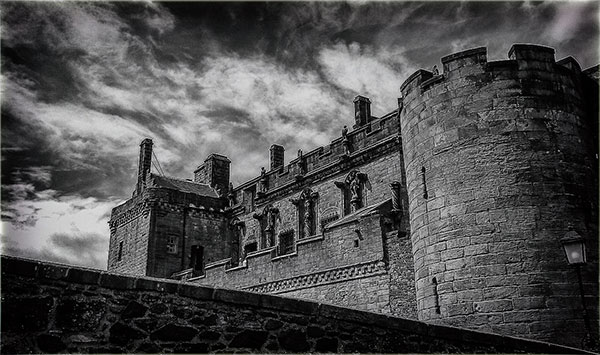
Fundamentalism, as a description, is used in different ways depending upon the context and point a writer is trying to make. I am using the word in its general dictionary meaning, such as given in the Cambridge Dictionary: “the belief that the traditional principles of a religion or set of beliefs should be maintained.” I am also referring to its historical context, as found in a set of essays published from 1910 to 1915 by the Bible Institute of Los Angeles (BIOLA) called “The Fundamentals.” In that series of essays, the writers called the church and the culture back to the so-called “fundamentals” of Christianity.
For an in-depth study of fundamentalism, I recommend George Marsden’s acclaimed book, Fundamentalism and American Culture. But in this post, what we might gather from the general dictionary meaning and the reference to the early essays, is that fundamentalism is about policing the borders or boundaries. We might think about Christian theology or doctrine as castles (Truth) of great importance. There they stand in the distance, big and beautiful. We must protect them. So, we begin to build walls around these castles; we build them thick and high. Once built, we then proceed to police them. Like guards, we walk along the border, the boundaries of the wall, to make sure no one scales the wall and attacks the castle.
It is easy to think we are very noble for doing this. Look at us: here we are on the very boundary, the border, diligent, making sure there is none who trespasses. We are the Protectors of Truth. We stand guard, night and day, so that the castle, the precious theology and doctrine (Truth), is safe from all those who might change it or get it wrong.
What makes “policing the borders” even more attractive is that it also allows us to be the gatekeepers. Someone approaches the border or boundary. They ask if they can see or enter the castle. They’ve heard of its beauty and they want to know more about it. Well, hang on just a second there stranger. What do you think about the castle? What is your view, your opinion, your doctrine, your theology? What group are you with? What is the history regarding how your group has viewed the castle? We “listen” to the answers given. We confer together. “Nope,” we say, “you are clearly not the person who should be seeing or entering the castle. Please move away from the wall and continue on.”
And, of course, this leads to a strict black-and-white notion of who is “in” and who is “out.” Borders and walls are great for determining who is on one side or the other, right? It’s obvious–I’m on this side, and you are on the other. It is all so clear this way. No gray. It’s black and white. I’m up here on the wall, and you are down there on the other side. I’m “in,” and you are “out.”
Historically, a good example of this type thinking, this policing the borders, was the Pharisees. They were always on the lookout for any who might be trespassing or trying to get over the border. And, one day, they found this strange fellow from Nazareth doing that very thing. He healed people on the Sabbath. He ate with “sinners.” He said he could forgive sins. He said he was God. And even when it was “clear” and obvious that God had said in the Hebrew Scriptures to hate one’s enemies, this fellow said, “But I tell you, to love your enemies.” This guy was the worst—a clear violator and trespasser. He was constantly trying to scale the wall, cross the boundaries, and destroy the castle. But the Pharisees, being so noble, righteous, and dedicated to policing the borders, finally put a stop to this guy. How? They had the state kill him.
This mindset, this understanding of what it means to be a “committed” Christian, this idea of policing the borders, is one of the fundamental (pun intended) flaws of fundamentalism. It is about building walls and boundaries, rather than bringing them down so that people can experience and enjoy the castle. The castle, if it is truly built by God, doesn’t need protecting or policing. It needs to be lived in and lived out of. Jesus was about destroying and bringing down borders, walls, and boundaries. He destroyed the one between Jew and Gentile, slave and free, male and female. He tore the curtain between the “outer” and “inner” part of the temple, the border.
The other thing this mindset, policing the borders, does, is it makes being judgmental a fundamental aspect of the Christian life, because it makes us the gatekeepers. But such a role is not given to us in Scripture. Jesus is the gatekeeper (and the gate). Jesus is the judge. When we take those roles upon ourselves, we end up making being judgmental the operating logic of our Christian life, which makes our lives the very opposite of Christian.
I’m not suggesting that theology and doctrine are not important. They are very important and not to be taken lightly. However, if our doctrines and theologies reflect what is true about God, then let’s invite people into them, to walk around inside and experience them. They might reject them. If so, at least they knew what they were rejecting. If they stay, they might try and rearrange some of the furniture. That is fine, as a community we can talk and develop a consensus—sometimes the furniture needs to be moved, sometimes not. No one said living in the same house would be easy.
Instead of building the borders and boundaries we then police, let’s tear them down, invite people inside the castle, and let God decide who belongs and how best to protect the truth, which is, after all, not a castle but a person: Jesus.
Image via Pixabay, edited by Dan Wilkinson.
 About Darrell Lackey
About Darrell Lackey
Darrell Lackey has been a lead pastor and is currently working in the private sector. He is part of a home gathering of some amazing, wonderful Christians and a graduate of the University of San Francisco and Golden Gate Baptist Theological Seminary (Now Gateway). He and his wife reside in Northern California.